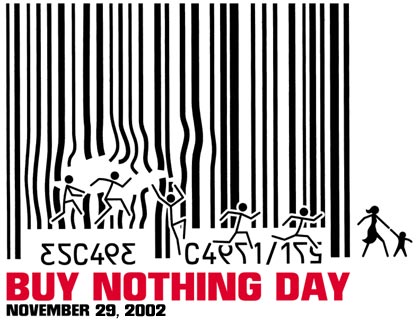26
Dec 2002Home for Christmas, finally (part 2)
Sunday, December 22nd. I get to the airport at about 8:30am. Check-in goes smoothly. Before long I’m on a plane. The only snag is that what I was told was a nonstop flight from Shanghai to Detroit was actually a flight with a stopover in Tokyo. Maybe I wouldn’t have to get off the plane, at least, and I could just sleep. I was ready for that.
On the plane I notice there are a lot of young people. Turns out there are two singing groups from universities in the U.S. which had been invited to Shanghai to perform. That includes religious Christmas songs. Kind of interesting; not interesting enough to keep me awake, however. My last thought as I drift off is, “I hope they wake me when they serve the meal….”
I awake as we’re arriving in Tokyo. I ask the girl next to me if there was a meal. “Yes, she tried to wake you. It was like you were dead to the world.” D’oh! Oh well. I was dead to the world. It’s the best way to sleep.
They make me get off the plane and wait around in the Tokyo airport for two hours. It’s strange hearing so much Japanese again so soon, when I wasn’t planning on it at all. Mostly, though, I’m just tired and hungry. I fall asleep in my chair and awake to the boarding call.
The flight starts off pleasantly enough. To my left is a silent Asian man. To my right is a large Marine, headed home from Okinawa with his family for Christmas. His family is behind us. He seems nice enough.
It isn’t long, however, before the trans-Pacific ennui sets in. I succeed in sleeping for a while. I devour a decent in-flight meal and sleep a little more. Soon, though, my Marine friend’s little 4-5 year old son “E.J.” becomes possessed. He is noisy. Then he starts this thing where he lies on his back in the seat and pummels my seat from behind with his feet. Not exactly conducive to restfulness. I can’t really complain because his parents tell him to stop. Thing is, he keeps just waiting a little while and then starting up again.
There is a mother and two nice young boys in front of me. They all love to recline their seats. I suppose that’s their right. My long cramped legs are forced into straddling the seat in front of me, my knee caps jammed up against the back of the arm rests of the seat. Then they come up with this fun game of repeatedly putting the arm rests up and down for no discernible reason. Are they doing it solely to keep painfully whacking my knee caps? Thanks.
My agony is interrupted by a new form of torture called Santa Who? — a “heart-warming” story of an amnesia-inflicted Santa who meets a selfish news reporter who needed a holiday change of heart. I watch the whole thing. I want to die.
Wait — now E.J. is pummeling me again and my friends in front of me are crushing my kneecaps with renewed vigor. Now I want to die.
There are only two good points to the flight. First, there seem to be an unusually large number of attractive women onboard. Not seated next to me, of course, but they are on the premises to give me something else to focus my attention on and help me pull through it. Thanks, ladies. Second, the airline serves ice cream after Santa Who? ends. Ice Cream! All right.
Silent Asian man is Chinese, as it turns out, and can’t figure out his immigration forms. I help him. He seems pleasantly surprised that I can help him with that in Chinese. His English doesn’t seem too hot. I found myself wondering if he always asks for Coke because he likes it, or because that’s all he can say.
Scooby Doo the Movie comes on. Vowing not to make the same mistake again, I refuse to put my earphones on. Still, my eyes stay glued to the screen, however, and I’m soon angry over the stupidity of the film. I manage to sleep a little more.
Hope comes in the form of the second in-flight meal. Not only does it satisfy my hunger, but with it comes peace to the whole plane, for a short time.
For the remaining stretch E.J. tests my patience. But I hold out. I don’t crack. We land.
Things start getting better after that, because I am actually in the U.S.A. I have just eaten, but I decide to spend some of my 3-hour layover in Detroit eating. I get chicken tacos with chips, salsa, and guacamole dip. You can not get that stuff in China! As I’m eating I notice someone else eating chilli cheese fries and I almost regret my choice of food. The discomforts of the past 13 hours quickly fade into the background as my stomach takes the spotlight. Plus there are more hot women in the Detroit airport. Hot American women. All right.
Before long I’m on my final flight, bound for Tampa. Is it just my imagination, or is the leg room shrinking with every flight?! My legs are really uncomfortable, but at least this flight is relatively short. As the plane lifts off the ground, I gaze out over the landscape. No snow. It looks like a sepia world, all in browns, tans, grays, drabs….
Despite the short travel time, my level of discomfort seems to rise proportionately. It is all I can do to keep from flipping out. I can’t sleep. I try to pass the time with the new issue of The Economist. Biotechnology in China. Hmmmm… (Ouch, my knees!)
In the end, after 24 hours of travel, I make it. As I arrive at the baggage claim, the familiar face of Paco greets me.
25
Dec 2002Home for Christmas, finally (part 1)
My Christmas this year has been an event partially shrouded in mystery since the summer. It was then that the idea to surprise my whole family with a Christmas visit home began to formulate.
Saturday, December 21st. I had meant to get on a bus to Shanghai as early as 3pm, but it wasn’t until 5:30pm that I finally make it out the door. I have been buying lots of Christmas presents and otherwise just preparing for my two weeks’ absence from school. Wilson graciously offered to cover my classes. He had the good idea of combining all our classes and throwing them in a multimedia room at night for those 2 weeks. So all I had to do was plan the content and put it into a wonderful PowerPoint presentation, which was then burned onto a CD and left in Wilson’s hand the day I left.
So I step out the door at around 5:30pm. It’s raining, as it has been for days. The shoes which I have purposely not been wearing for the past 2 days in order to make sure they’re dry for my trip home are wet within 10 minutes of stepping out the door, despite my umbrella. The guard on the ground floor of our building says this damn rain is going to continue for another 3-4 days, at least. All I can think is I’ll be home soon….
I get out to Zhoushan Dong Road just in time to miss a taxi. And then it’s 30 minutes of trudging through a gray, wet world, my rolling suitcase reluctantly trailing behind me on this misadventure. I timed it just wrong: 6pm is when taxi drivers get off their shifts, so around 5:30 the drivers are all heading back to the station and refuse to give anyone a ride, even if the car is empty and the “vacant” light is on. It’s almost impossible to get a taxi at this time of day, but I was standing out in the rain with a heavy suitcase full of gifts and a backpack, and I was going home. Unfortunately, the taxi drivers don’t seem to realize this. Empty cab after empty cab whizzes right by my wet, frantically flailing figure, my furious curses unheard.
Eventually, someone does stop. For some reason, when drivers are getting off duty, they do this thing where they pick up a friend (?) before getting their last ride, and then drop off their friend on the way to your destination. It’s definitely not legit, but they all do it. After waiting 30 minutes in the rain, I wasn’t going to complain.
On the way to the bus station, there’s a traffic jam. All the huge construction trucks in Hangzhou seem to have congregated on the road we need to take to get to the East Bus Station. Our driver doesn’t seem to have much regard for our personal safety, or at least not for the structural integrity of his vehicle. Our windshield repeatedly comes scant inches from the lower end of the huge truck in front of us. Time wears on, and my driver quickly learns I am not in a chatty mood. I am beginning to wonder if there are still going to be buses to Shanghai by the time I get there.
So I finally arrive at the East Bus Station. I loathe that place. It’s hard to explain exactly why, but the scalpers that assail you before you’re even out of your taxi would definitely be high on the list. Shanghai, Shanghai! they yell in my face. The fact that I was actually bound for Shanghai makes them all the more annoying.
When I get to the ticket office, there is a small crowd outside, but no one inside. All the ticket windows are closed up. “They’re closed,” the scalpers gleefully announce, a grinning pack of vultures descending upon me. “Shanghai…”
Defeated, I begin reluctant negotiations with them, and 80rmb is the cheapest I’m hearing. I start following that offer, but as I trudge past the Shanghai-bound waiting room, on a whim I duck in to investigate. The girl at the front tells me I can still buy a ticket to Shanghai. I’m not getting her convoluted instructions to the last remaining open ticket window, so she kindly takes me there herself. I buy a legit 55rmb ticket to Shanghai that leaves in 10 minutes. I am ecstatic.
So I try to sleep on the bus to Shanghai, and to dry out my feet a little as well. Both efforts only meet with limited success. I am chagrined to notice that although the VCD being played is not showing up on the screens (evidently the video out isn’t working), the inane Chinese soap opera dialogue nonetheless spews on. Greeeeat….
I get to Shanghai and meet my friend. I had a good dinner. Get to see famous Hong Kong director Wong War-kai’s movie In the Mood for Love, and I gotta say, I am not impressed. Yeah, I can see the artsiness of the cinematography. I suppose it is cleverly filmed. But in my mind no movie can be forgiven for failing in its primary function: entertainment. This movie and its endless parade of qipao bores me.
Sunday, December 22nd. Probably partly due to In the Mood for Love, I fail in my effort to stay up all night. I do that so that I can be blissfully unconscious for the 20+ hour journey home to Tampa, Florida. I inadvertently get a few hours of sleep. These few hours almost make me late leaving for the airport. I leave in a rush.
My friend told me that I should ask for a 20% discount to the airport since it was so far. I was aware that in Shanghai you can sometimes negotiate cheaper taxi fares, but in my experience that only happens at night. So when I stop the first taxi I come across and tell him I want to go to the Pudong International Airport and I expect a 20% discount, the driver is a little surprised too. “In the daytime?” he says. “I’ll give you 10% off.”
“Never mind,” I say, and start walking.
A minute later my luggage and I are in the taxi. 20% off it is. It is 7:30am, and my flight leaves at 9:30am. It might be as much as an hour’s drive to the airport. I am a little nervous.
20
Dec 2002Bicycle, Swim, Car Poll
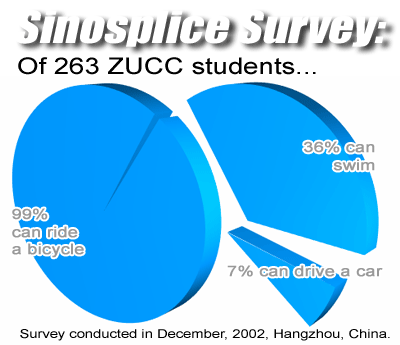
Note: In most cases, those who claimed they could drive did not actually have a driver’s license.
19
Dec 2002Leylop has her own blog!
Leylop has her own blog! Leylop is a junior at Zhejiang University here in Hangzhou, and she’s been a regular commenter here for a little while now. I’m not sure how she found my blog, but I’m glad she did. It’s good to have a Chinese voice in the comments. (Hoping to hear more from Lily too…) Leylop is now writing her own blog (in English). I was glad to help her figure out the blogging basics. She’s also doing a little survey of foreigners living in China. If that’s you, take a few seconds to fill it out. It’s really short.
17
Dec 2002Frames and Tunes

Check out those 3.5″ X 5″ real wood picture frames. Note the smooth, graceful curves of the frame on the left and the timeless straight lines of the frame on the right. Classic backing design. All three frames just 10rmb!
No, this is not a catalog. But can you believe that?! Only 10rmb (US$1.25) for all three frames. I don’t know who decided that in the USA frames are allowed to be expensive, but it’s not right!
Speaking of frames, let me change the subject to music. Recently I was investigating what music is currently popular in the States. You know, I’ve been in China for some time now, but I still maintain a scholarly interest in the evolution of contemporary American pop culture. (Ha! Actually, I was starving for new music…) I’ve been meaning to check out more Gorillaz songs off the first album (besides Clint Eastwood), so I snagged a few of those. I also saw that a new band which calls itself The Transplants has gained some popularity in the past few months, and I caught their tune Diamonds and Guns through Shoutcast.com. Man, I can’t get enough of this song! Their other songs are good too! Admittedly, I’m a Rancid fan, but this stuff is different, and good. The punk/hiphop/rap/metal fusion style reminds me a little of Gorillaz. I just wish that it wasn’t so hard for me here to come across new bands like this.
17
Dec 2002Race, Schmace
Race Not Reflected in Genes, Study Finds:
“There is wide agreement among anthropologists and human geneticists that, from a biological standpoint, human races do not exist,” Sergio Pena and colleagues at the Universidade Federal de Minas Gerias in Brazil and the University of Porto in Portugal wrote in their report, published in the Proceedings of the National Academy of Sciences.
“Yet races do exist as social constructs,” they said.
I remember learning in my Japanese anthropology class about how scientifically, race is nonexistent. Here’s the same idea again.
It’s funny–the United States is regarded by all sorts of countries (including Asian ones) as a country with race problems–and yet racism thrives here. It’s just very hush-hush. I remember reading something a Chinese person said, as quoted in the China Lonely Planet: “There is no racism in China because there are no black people in China.”
If you ask a Chinese student, probably over 90% will tell you that there is no racism in China. Yet if you force them to answer the question, there is definitely a sort of “heirarchy of acceptability” for marriage: Chinese first, then Korean, Japanese, Caucasian, African. Why? “No reason,” they say. I can’t tell you how many times I’ve heard Chinese people say they don’t like black people even when though most of them have never even met one.
Japan has serious problems as well. Many Japanese people seem uncomfortable acknowledging that a lot of their genes are shared with the Ainu minority people and the Koreans. Scientists work hard to disprove these theories to maintain ridiculous concepts of “racial purity.”
Asians tend to keep their mouths shut when they have something disagreeable to say, and they don’t go burning crosses or anything like that. But make no mistake about it, no matter what they tell you. Racism is well established here.
15
Dec 2002Whingefest
Not long ago I had an IM conversation with Alf. He’s teaching in Xinxiang, and he clearly does not have a foreign teacher community over there like I now have here. He mentioned that his friends that read his blog say that his blog is mostly just a bunch of complaints. We talked a bunch about those complaints. I post occasional complaints, but I haven’t posted many lately. I think having complaints is a natural part of living in a foreign society. I think I need to unload a few more.
First is the toilets here. The toilets ZUCC gives its foreign teachers are horrible. Yes, they are Western style. That’s not the problem. One problem is that the seat is attached with these shoddy plastic screws that break after about 4.6 seconds of actual use, resulting in a toilet seat that slides around instead of remaining respectfully fixed in place. But the real problem is the flushing. These toilets are not so good at it. There’s just no power behind the flush. It’s maddening. I feel blessed and lucky if I can go number 2 without having a big long plunge session afterwards. It wasn’t like this at first. It used to be OK (but never good), and the problem seems to have worsened over time. Now I’m plunging practically every day! I’m a teacher, dammit, not a janitor! (I would include a pic of this “toilet of the damned,” but my latest plunging efforts were a failure. I’m currently taking a break before tackling the problem with renewed vigor, and in the meantime you really do not want to see a picture of that…)
Last month the school held a special feedback session, allowing the foreign teachers to share their ideas and complaints with various departments of the school. I took it upon myself to bring up the toilet issue. They said they would handle it. Last Friday some guys came to take care of it, but after inspecting for a while they said they couldn’t do anything, that the toilets were just like that. Horrible quality. I say the school owes it to us to replace the hellspawn toilets with toilets with actual flush power. As newly appointed “foreign teacher liaison” for next semester, this will be one of the biggest items on my agenda. It will be my personal crusade. I will be the perpetual thorn in their side, quietly whispering “give us good toilets” until they either comply or go insane. I will triumph in the end.
So it’s winter now. In Hangzhou, that means it’s cold and wet. Of course, it’s not Harbin cold or anything, but many houses here don’t have heating. Also, although it rarely snows in Hangzhou, it’s so humid here that the cold penetrates. To make matters worse, a lot of Chinese people even leave the windows open in the dead of winter for “fresh” air. So how do they keep warm? They don’t. They bundle up inside as well as outside. It’s pretty horrific from a Western perspective. Fortunately, we foreign teachers have heating in our apartments, but it’s not central heating. Also, buildings are not insulated here, and leaks around windows and doors are not properly sealed. Warm air quickly leaks out if the heater is not run continuously. The Chinese way of just bundling up inside starts to make a little more sense. But we foreigners are, of course, fighting the good fight and blasting that heat for the cold nights. When you come home to a cold house and crank up the heat, it starts pouring out, but obviously, hot air rises. So as I wait for the room to heat up, I often find myself sitting at the computer, feeling the effects of an upper layer of warm air slowly pushing downward, displacing the cold air throughout the room. First my head is warm while the rest of me is still quite cold, and the border gradually moves down my torso as the rooms heats up. At first a big bedroom with a high celing seems like a great thing, but in the winter the drawbacks become chillingly apparent.

I now have a new weapon in my arsenal to combat winter here. Wilson and I recently bought heating lamps (yu ba in Chinese) for our bathroom. They pulled the ventilation fans and installed the heat lamps (which also have a built-in fan behind the heat lamp bulbs). Heat never really seems to make it into the bathroom in the winter, so these heat lamps feel like an amazing luxury.
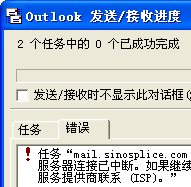
Why can’t I access Yahoo Mail anymore? I don’t know. Even when I use a proxy server, about half the time I click on anything it can’t find the page and I have to reload. It’s really annoying. Pretty much at exactly the time this started happening, I switched over to using Outlook (I don’t like Microsoft domination, but it at least has good Asian language support, so I must succumb at last…). I randomly get these weird errors when I use Outlook. Some error with the POP connection. It’s all in Chinese and I hate it.
It’s 2002, and I’m 24. I think this is the year my metabolism finally quit. I seem to have lost the ability to eat continuously without a second’s thought of any possible consequences. I’m not as skinny as I was, and there doesn’t seem to be any obvious reason for it. I definitely need to exercise more, though.
Note: “Whinge” is an Australian word that means “complain.”
11
Dec 2002Japan on China
This article is great. Clearly, I have a special interest, my studies taking me deep into both Japanese and Chinese culture. But seriously, the Japanese are just so cute sometimes. All this and insight into their culture as well. You gotta love it. I’d love to see more articles like this. Thanks to Addicted to Life for finding this and sharing.
On a related note, a new poll shows that the Chinese still don’t like the Japanese. Big surprise. Sorry, the article is from the People’s Daily, so it doesn’t make for the best reading. (And they even included in the article one of my Chinglish pet peeves: the Chinese can’t use the word “so so” without adding “just” in front of it! Grrrr…)
09
Dec 2002Alien Hominid

Alien Hominid
OK, I know this has absolutely nothing to do with China, but I can’t resist. I love this game, and I must share it with the world. It’s called Alien Hominid. You’re this alien that crash lands near the FBI headquarters. You know the American government — they immediately get all violent and come out guns blazing. So it’s a fight for survival, you against the FBI dudes.
The animation style is really great, so even though it’s kind of graphic (you can bite the FBI guys’ heads off! Cool!), it’s a lot of fun. It’s by a really talented 23-year-old animator who calls himself Synj. It’s sponsored by NewGrounds.com, which is a great site for Flash stuff. Check it out.
05
Dec 2002More Polls…
These two questions are pretty unscientific, I know. The students’ answers are very subjective. Before the questions, I made sure they understood what I meant by “care.” Still, interesting results. A trend is uncovered.
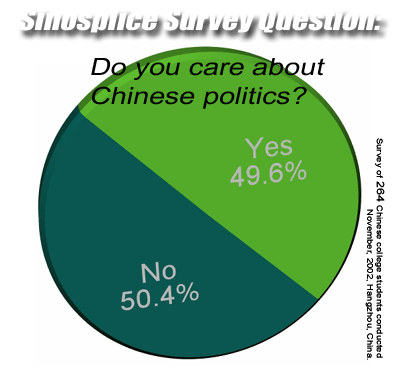
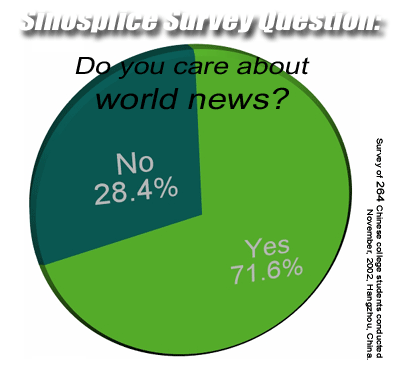
Obviously, the word “care” is crucial, because what does that mean? One can easily say one cares, but then that “caring” doesn’t actually manifest itself in any actions.
Also, this is not secret ballot. When students declare they don’t care, they do so publicly in front of the whole class as I count hands. There’s less of the “herd mentality” than you would think, however. You do get one or two people defying the rest of the class and voting how they really feel at times.
03
Dec 2002Earth-shattering Poll Results!
So many people have been writing me begging for the results of the next poll that I couldn’t wait any longer to post them. (Yeah, riiiiight…) Anyway, I find the results of the latest poll very interesting. Maybe at least one other person out there will too. My latest poll had three parts. I’ve got the data all tabulated and represented prettily in nice graphics, but I’ll just release one result today (ooh! Suspense!). But worry not — it is definitely the most significant poll thus far.
The question was: “Who is the greatest person in 5,000 years of Chinese history?” These college kids have to study a lot of Chinese history throughout their educations. They’ve learned about many a historical figure. They’ve also been subject to quite a bit of propaganda. Given these points (particularly the last one), I fully
expected a landslide victory for Mao Zedong. The guy is still a national hero. He’s still talked about. He’s on every bill now (100, 50, 20, 10, 5) except for the one. (Seems kinda insecure of the government to go that far in promoting the guy, doesn’t it?) He seems the natural choice. In asking this question, I didn’t feed them any answers. I let them come up with the list of people to choose from before I started counting votes. I left the qualifications for being
“great” completely up to them. Anyway, without further ado, here are the results:

For those of you that don’t know, Qin Shihuang was the first emperor of China. He united China but was a completely ruthless bastard to do it. He’s credited with the Great Wall project and the Terracotta Warriors were made for his tomb. Li Shimin was a great emperor of Tang Dynasty China — China at the height of its ancient glory. Wu Zetian was also a leader from the Tang Dynasty, but she was an empress. I noticed she only got girls’ votes. A vote for her is a vote for Chinese feminism, maybe? Anyway, I’ll let you all draw your own conclusions. If you know who these people are, then I’m sure you’re very capable of that. Post your comments…
01
Dec 2002Almost Thanksgiving
So last Thursday I celebrated Thanksgiving with 5 other foreigners at the Hangzhou Holiday Inn (yes, that’s the same Holiday Inn you’re familiar with). Four of them were American. By Chinese standards, the Western all-you-can-eat buffet was not cheap — 148 rmb (about US$18.50) — but no one regretted shelling out the cash. It was good. I taught my class last week that there are 6 “main Thanksgiving foods” that most American families eat on Thanksgiving: (1) turkey, (2) stuffing, (3) cranberries in some form, (4) pumpkin pie, (5) mashed potatoes, and (6) sweet potatoes. I also explained that every family has different traditions; the list is not definitive (so no one leave huffy comments because I wronged your Thanksgiving traditions to all of China).
My complaints about the “Thanksgiving meal” were: (1) the stuffing came out of a cookie dough-type tube! Yuck! (2) No mashed potatoes! Come on! But hey, it was still pretty good. As I told my students, food is very important on Thanksgiving, but what’s more important is being with family. So even good food couldn’t quite do the trick. Here are a few pics:
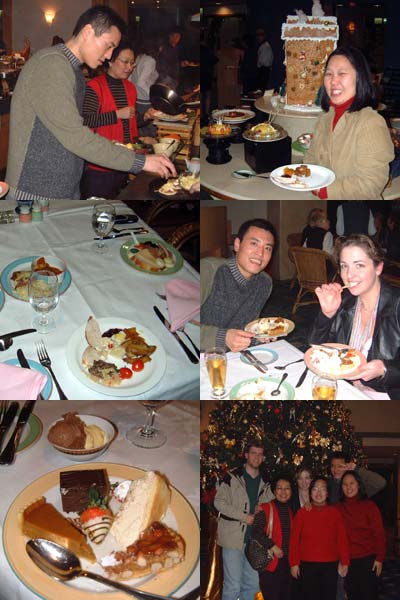
01
Dec 2002Zi Head
See if you can guess what the deal is with this pic. Or, just be lazy and see below.
We ran into this guy in the Holiday Inn lobby. He was being interviewed, and he let me take his picture. This is how he advertises. Chuck has the (very short) story in his blog. This particular ad is for a soccer pool.
27
Nov 2002Harvesting Stats
Living in China has its fair share of inconveniences. The ones that immediately come to mind are being on the opposite side of the globe from most of my friends and family, and a big long list of things I can’t eat here (oh, cheesecake! I miss you!). But there are some great benefits too. The benefits are so numerous and unexpected that you can live here for years without realizing them.
One of these benefits which I discovered early on in my first semester at ZUCC was the potential for gathering information. Sure, the teacher’s up there to teach the students, and then the teacher can learn from the students as well. But I mean something far more direct. You can gather information on Chinese society straight from your students and even make it part of classwork. My first semester I taught American Society and Culture, and one of the regular assignments I gave was a one-page written response to the latest chapter’s material. I encouraged students to make comparisons between Chinese society and what they learned in the book, or what they learned from me, or what they knew of American society already. At times I cursed myself for giving those assignments because it gave me a lot to read. But what I gained! Students would often write out what they wouldn’t say in class. I learned a lot about Chinese families, government, education, etc. from those papers. More than my students learned from me, I fear.
Anyway, despite the precious info I gleaned from those papers, they were a one-semester thing. It was just too much work to read them, and I had to read them all or some of the students would plagiarize like little fiends. And I wasn’t about to let them get away with that, less because of the dishonesty factor and more because I didn’t want them to ever think for a second that they could outsmart me.
Since then, I’ve picked up this and that from miscellaneous discussions and such in class. But it’s never been such pure information downloading as it was with the papers. Recently, though, something rekindled my lust for data. I think it began when I asked my class if they shared my excitement about a new generation of leadership in the Chinese Communist Party (they very much didn’t), and a little discussion on their feelings about politics ensued. Basically, they felt that they had no control over politics, so they didn’t care. But the idea of taking polls in class took shape in my mind.
So, lately I’ve been surveying my students on various topics. I’m carefully noting the data, and I’ll report the interesting results I find. I have close to 300 students. Sure, my students typically come from upper class Chinese families, because the tuition here is quite high for a Chinese college. But that doesn’t mean the data won’t yield trends that are interesting and telling. I’m loving this. I’ve got lots of good stuff on the way. So without further ado, the results of my first poll…
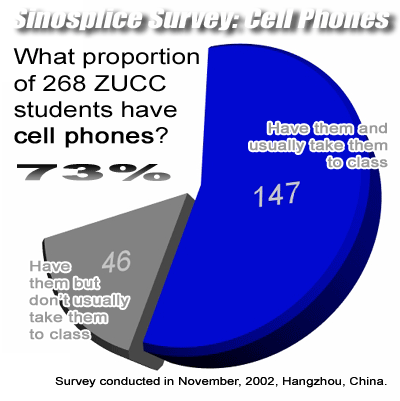
Is that higher than you expected? Cell phones are definitely common on the streets in Hangzhou. They’re everywhere. The ::beep:: ::beep:: of the SMS message alert permeates every nook and cranny of town. Furthermore, while Hangzhou is the capital of Zhejiang Province–a quite wealthy province–keep in mind that this is still Hangzhou, not Hong Kong, not Shanghai, not Beijing (those three places have cheesecake!). Also, the fact that so many of the students bring their cell phones to the classroom is a serious factor for the teacher. There’s little more infuriating in class than a student ignoring you because his gaze is transfixed on the LCD screen of his cell phone. They think you won’t see them if they keep the phone below the surface of the desk. Makes you wanna grab the phone, chuck it out the window, and smack the student.
Anyway, the polls have begun. And may the data collecting proliferate among the foreign teachers here in China…
26
Nov 2002Laowai Circus
Things tend to happen to me in China in clumps of weird connections. Example: my first year in Hangzhou I lived with my Chinese friend from UF’s fiancee’s dad’s boss’s son. (Didja get that?) This past Saturday I went to Wuzhen, a small, scenic, historic town (guzhen in Chinese) with a small group in order to film a travel show for the Zhejiang TV station. The trip was unpaid, but I didn’t pay for anything either — transportation, lodging, food was all paid for. And it was a good opportunity to meet young Chinese people. So how did I get that hookup? My e-mail penpal (Erin)’s co-worker (Vivienne)’s date’s co-workers were looking for a foreigner who could speak Mandarin for the show. Turns out they got two from my school. Kiwi Chris can also speak it, and so he went too.
So that was my Friday and Saturday. We were a group of only 6, and it was nice. 2 foreigners, 1 Wuzhen tourguide, a camera crew of 2, and 1 show hostess. There were times when the Chinese and foreigners would detach for separate conversations, but there was plenty of friendliness and good feeling as well. I’ve gotta say, Wuzhen was just a little bit boring, but it was cool to learn how they do some of the traditional crafts like making rice wine and weaving cloth. Check out the pictures. As far as the location, I think I still prefer the first guzhen I visited: Xitang.
I’ve been told that the show airs this Saturday (Nov. 30th) at 9:55pm on Zhejiang TV-3, then again the following Saturday (Dec. 7th) at 11am and 4pm, Zhejiang TV-3.
22
Nov 2002Women and Children
My blog entry entitled “Ghost Alien Love” got quite a few interesting comments related to love and women in China. I have also discussed love/women issues with my Thursday night advanced conversation class, and I learned a few interesting things about Chinese law and society:
1. It is illegal for a woman to have a baby out of wedlock in China. An unmarried woman is required by law to get an abortion if she somehow gets pregnant. (But that couldn’t happen in this conservative society, now could it?) Well, until recently… (see below)
2. If a married woman is pregnant, it is illegal for her husband to divorce her until well after the delivery.
3. If a married man is found to be cheating on his wife, and the wife doesn’t want a divorce, she can force him by law to give her monetary compensation for his infidelity. (Yeah, I’m sure that gets used a lot. No colossal loss of face for the woman or anything…)
Kinda crazy, eh? But there’s this new law in Jilin province (way up north) that allows unmarried women to have a baby through a legitimate fertilization clinic. I’m wondering why?? Is there a big demand for that up there?? And it’s not like this is a democracy, so even if there was a big demand, that doesn’t guarantee results in legislation. This is still a rather conservative society on the surface, so I find this bizarre. I couldn’t find any English news on this, but here’s a Chinese link if you can handle it: [Yahoo News China, Nov. 11, 2002].
As crazy as I thought all this was, though, a Chinese friend recently told me about a female cousin in Shanghai, late twenties, who wants to have a baby on her own. And get this: not the Jilin way. She’s out looking for “Mr. Right” to do the deed and plant the seed, and then she’ll just raise the baby on her own! You may not find that outrageous, but you have to realize that an illegitimate child in China has a hard life. They can’t be properly “registered,” and so aren’t eligible for schooling. There are all kinds of headaches. Not something you choose, if you can help it.
But hey, this is China. It’s changing fast.
18
Nov 2002Questions…
Not long ago, a page on Bokane.org reminded me of a question that’s been in the back of my mind and close to my heart for over two years now. It’s a question that I started asking in 1997, and which has become especially persistent over the past two years. Now it’s in the forefront again, running amuck and causing havoc. Oh, it’s not doing any real damage, of course. It’s tantalizing. Like the puppy in the short box, no matter how many times you push it back, it just keeps emerging. And though you may lose patience with it, it remains interesting. But what can you do other than push it back? You’ve got somewhere to go. It isn’t a part of your itinerary. Yet it won’t be ignored. And its teeth, while mostly harmless, can hurt.
I asked Wilson recently, “During all this time you’re spending in China, are you becoming more and more yourself, or more and more someone else?” I tend to hate those kinds of questions, because the person asking them usually just seems smug that they’ve thought up an annoying meaningless question to irritate someone else’s intellect with. But this time I cared about the question, and I cared about the answer. I really wanted to know what was happening with Wilson, and what he perceived of it. And, of course, whatever mysterious forces there are that have been messing with Wilson’s identity for almost a year have been doing the same to me for over two years. It was personal.
Wilson said he’s becoming more and more someone else. Someone he likes. Someone with purpose and drive.
And me? I know I’m different, but I’m not even sure I know how I’ve changed. What’s scarier is the prospect of how much change there is that I don’t recognize.
Who am I now? Is this a result of my decision to come to China, or a result of being in China?
Am I really so different?
Will they even know?
12
Nov 2002Busy, Busy
So I’m keeping busy lately. Life just won’t slow down.
Still trying to figure out where I’ll be next semester. Many possibilities, little time to figure out which to go with. | I shut myself in all weekend this past weekend writing my book. It’ll be a nonfiction masterpiece that will rock China (in a good, PC way) when it’s released. Making good progress there. Talks for publication in progress. | I’m the new DJ on campus. (I burned an “introduction to punk” CD, complete with voiced intros to each song, all done by me. The station is supposed to start airing it this week. They want more.) | Still lots of plans for my site, to be slowly implemented over the period from now to eternity. | The internet is still fun and amazing, after all these years. Who’da thunk it?? | Still have classes to plan and teach, but all is well. Next week is song/commercial week. I have the whole Budweiser “Wazzup” series on DVD. China must witness. | I think I need to start a juggling club on campus. | Polls are in the works. | I need to reinstall Windows XP for the fourth time, thanks to Chinese pirated software. | My friend Miya was supposed to come for a visit from Japan this coming weekend, but now she can’t make it due to a family emergency. | I need to go learn some Chinese so my tutor doesn’t scold me too harshly tomorrow…




